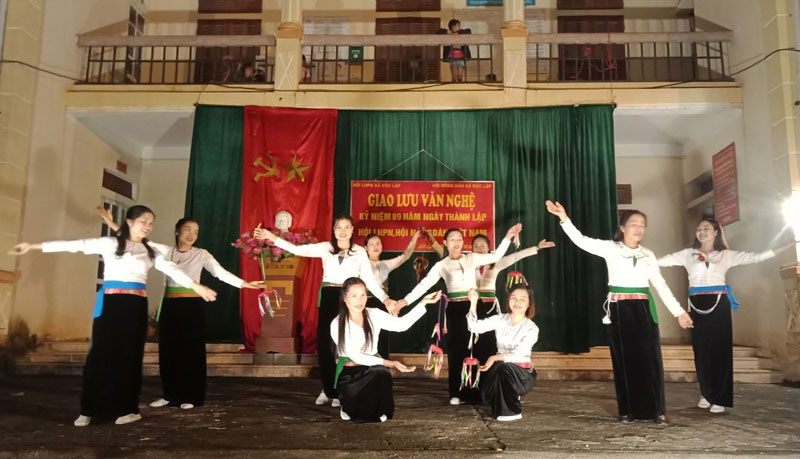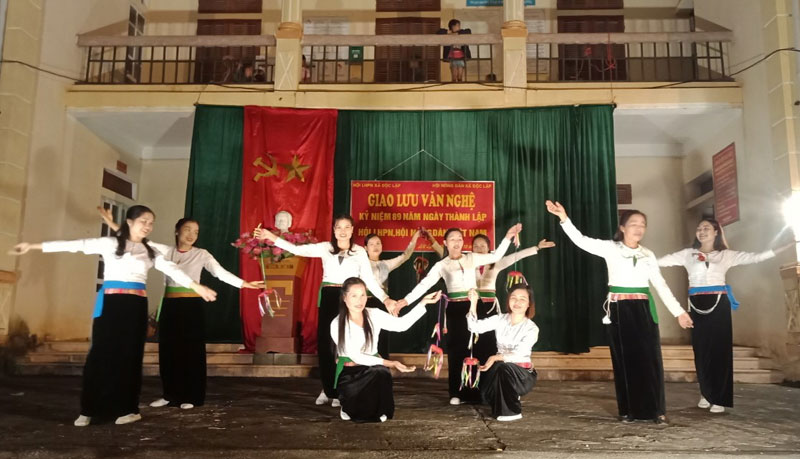
(HBO) - 98% of the population in Doc Lap Commune (Hoa Binh City) are Muong ethnic people. Within the city’s area, this is the commune with the highest percentage of Muong ethnic people. In recent years, along with building a new cultural life, Doc Lap commune has always preserved the cultural identity of Muong ethnic people from the stilt houses, the costumes to the ancient gongs.

The women in Doc Lap commune (Hoa Binh
city) have maintained their cultural identity through the traditional costumes,
the songs and the dances of the Muong ethnic group.
Currently, 100% of the hamlets in the
commune have established the conventions and regulations on the cultural
lifestyle and they have regularly been revising to suit the reality. 100% of
the agencies and the schools have been built green - clean - beautiful - civilized.
The movement to build the cultural families, villages, agencies, units, and
schools has achieved remarkable results.
Every year, more than 80% of the communes
reach the standard of the cultural family. Regularly, from 5 to 6 out of the 6
villages reach the title of the cultural villages. The movement "All people
exercise their bodies following the example of the great Uncle Ho” has been
widely developed. Six out of the six hamlets have built their cultural houses
and sports fields. 44% of the population have been participating in regular
physical training and sports. Every hamlet, agency and school have their own
art performance teams and group, cultural clubs operating regularly and
effectively. The activities of mass culture and art performance, information
and propaganda have been widely developed.
The highlight of the cultural life in Doc
Lap commune is the preservation and promotion of Muong ethnic cultural identity
in the modern life. The Women's Union of the helmets has propagandized and
encouraged each female ethnic minority of Muong to have at least one
traditional costume to wear on holidays, New Year, weddings or festivals. The
Women's Union is also a key factor in building and maintaining the
effectiveness of the model "Preserving and promoting Muong ethnic cultural
identity through Muong folk songs”.
In recent years, the team of Muong's gong
with the strength of ancient gongs has made its own impression and identity in
the cultural activities of Ky Son district. More valuable is that at schools
such as Suoi Hoa kindergarten, Doc Lap semi-boarding high and secondary school,
the issue of preserving and promoting the Muong ethnic cultural identity is
specially paid attention. From 2016 up to now, Doc Lap semi-boarding high and
secondary school has been maintaining the operation of the team of Muong Gong.
The team has participated and achieved many high achievements in the arts
festivals of the education and training sector.
With an increasingly vibrant and widespread emulation movement aimed at building cultured residential areas and cultured families, Yen Thuy District has been making steady progress toward improving both the material and spiritual well-being of its people, while fostering a civilized, prosperous, beautiful, and progressive community.
Once lacking recreational spaces and community facilities, Residential Group 2 in Quynh Lam Ward (Hoa Binh City) has recently received attention for the construction of a new, spacious, and fully equipped cultural house. The project followed the model of state support combined with public contributions in both labor and funding.
The "All people unite to build cultural life" movement, which has been effectively integrated with Kim Boi district’s socio-economic development goals, is fostering a lively spirit of emulation across local residential areas, hamlets, villages, public agencies, and enterprises. In addition, through the initiative, traditional cultural values are being preserved and promoted, while community solidarity and mutual support in poverty reduction and economic development are being strengthened.
A working delegation of the Hoa Binh provincial People’s Committee led by its Permanent Vice Chairman Nguyen Van Toan on June 11 inspected the progress of a project to build the Mo Muong Cultural Heritage Conservation Space linked to tourism services in Hop Phong commune, Cao Phong district.
Born and growing in the heroic land of Muong Dong, Dinh Thi Kieu Dung, a resident in Bo town of Kim Boi district, in her childhood was nurtured by the sweet lullabies of her grandmother and mother. These melodies deeply imprinted on her soul, becoming an inseparable part of her love for her ethnic group's culture. For over 20 years, this love for her hometown has driven Dung to research, collect, and pass down the cultural values of the Muong people to future generations.
In the final days of May, the Ethnic Art Troupe of Hoa Binh Province organized performances to serve the people in remote, mountainous, and particularly disadvantaged areas within the province. These were not just ordinary artistic shows, but they were the meaningful journeys aimed at spreading cultural values, enhancing the spiritual life of the people and contributing to the preservation of ethnic minority cultural identities.



